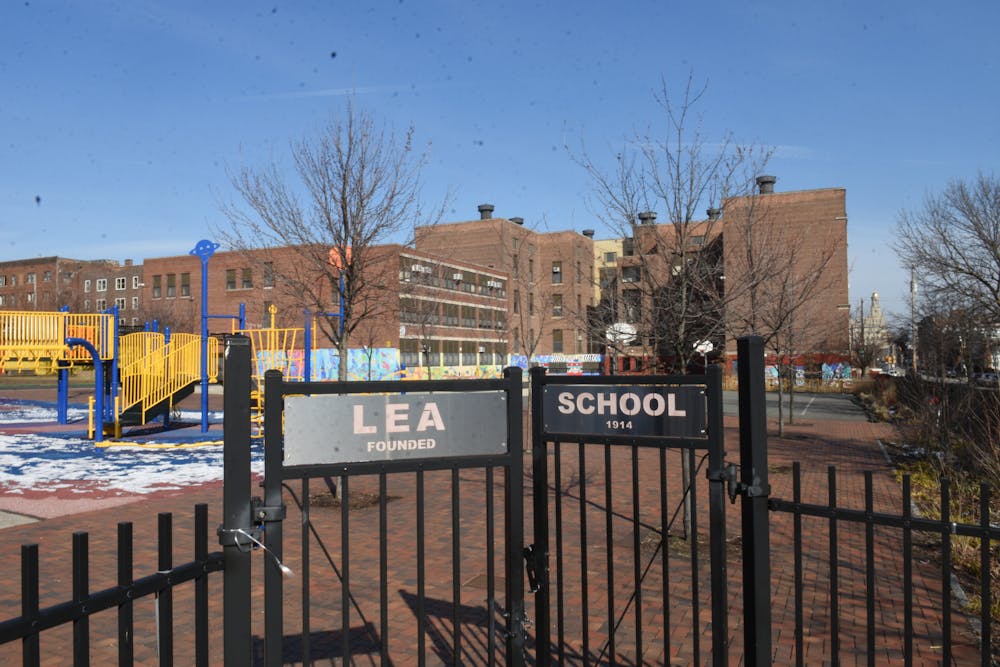
My friends know not to bother me on Thursday nights — I’m too busy watching the newest episode from season four of “Abbott Elementary” on Hulu. I’ve been a proud viewer and fan of the show for years, but this season feels particularly special to me, now sharing West Philadelphia with the fictional world of public school teacher Janine Teagues. As Penn students, the majority of us are both uniquely separated from and inherently a part of the world portrayed in the sitcom. We are simultaneously far removed from the struggles associated with West Philadelphia’s public education and yet passive contributors to the broken systems around us. Although “Abbott Elementary” can teach a general audience so much, what it has to say ought to be taken particularly seriously by Penn students.
A brief summary for those who haven’t had the pleasure of watching the show: Janine Teagues is a public school teacher who teaches second graders at Willard R. Abbott Elementary School in West Philadelphia. Teagues and her quirky yet endearing fellow teachers, custodian, and principal navigate what it means to support young students in a system that often cannot address their needs. This usually entails creative inventions (and lots of heartwarming, hilarious bits) to overcome challenges of underfunding, poor resource allocation, and other all-too-real struggles faced by real West Philadelphia teachers and students.
Arguably the most obvious and important lesson for Penn students to learn from watching the show is understanding the dynamics of the average West Philadelphia classroom itself. For those who are generally unaware of the drastic underfunding and underresourcing of these schools, the show encourages this audience demographic to learn more.
For those who are already aware of the issues within the system, the show can serve as a reminder of an equally important yet underrecognized aspect in conversations about public education — its hopefulness. The ethos of public education, that all children deserve an education, is beautiful and affirming. This is reflected in the invincible spirit and warm joy of the show. Inherently humanizing, humorous depictions of daily life within a flawed system emphasizes that public school students and teachers don’t need to be condescended to or pitied — rather, we should engage with the community around us and take action to help.
Pennsylvania notoriously has one of the most inequitable education systems in the nation, and perhaps contrary to popular belief, there are things we can do about that as Penn students. We must utilize opportunities to help local students and teachers offered by the Netter Center, advocate for Penn to directly financially contribute to the city and, most of all, learn about the community around us.
Before this area was University City, it was recognized by the city as “University Redevelopment Area Unit 3.” Locals soon dubbed it Black Bottom. A product of severe urban segregation, the predominantly Black neighborhood was a thriving place of small businesses, homes, and community spaces due to the efforts of its residents. Despite the economic and social vibrance of the community, urban renewal efforts (read: gentrification) deemed these areas blighted, and financially backed redevelopment efforts displaced several thousand individuals. The University played a heavy hand in these redevelopment efforts in the 1950s, and as a result, Black Bottom became University City. As members of this university, we should know its history and use local resources to contextualize our place in the city.
The backdrop of gentrification is a key motif of the show. The first episode of season four sees the characters reckoning with what the development of a new golf course means for West Philadelphia. This intentionally holds a mirror to the alarming effects of gentrification which many West Philadelphians are feeling right now.
It’s no surprise that such direct parallels exist within the show and real life — after all, Abbott Elementary is based on the real Andrew Hamilton Elementary School, which Penn actually maintains a community partnership with. Quinta Brunson, the show’s creator and actress playing Teagues, is herself a Philadelphia native who attended Hamilton Elementary. Brunson’s impact has been recognized by the city, and she even spoke at the Graduate School of Education’s commencement ceremony last year.
To add to the reasons why the show is relevant to us, Teagues is a Penn graduate. From the red and blue pennant hanging on her classroom wall to the occasional cheeky Penn reference, the audience is supposed to be aware of her alma mater. Penn students ought to see something inspiring in this lore — our degrees are often seen as catalysts of prestige or financial success, but Teagues is a reminder that what we do with such a comprehensive, world-class education can be about so much more. Deploying the skills we have gained from this university with empathy and consideration, even on a small scale, can be profound.
We, as Penn students, hold a remarkably unique position in this city. “Abbott Elementary” portrays the very real communities and spaces that our institution has historically affected, with humor, humanity, and hope. The show serves as a reminder that we should do more for the space we occupy. This city is beautiful and deeply storied; we are equally as fortunate to be a part of Philadelphia as we are to be a part of this university. “Abbott Elementary” should remind us to educate ourselves about the city’s history, be engaged in the present community, and work hard to help its future.
ARSHIYA PANT is a College sophomore studying history and legal studies from Kansas City, Kansas. Her email is arshiyap@sas.upenn.edu.
The Daily Pennsylvanian is an independent, student-run newspaper. Please consider making a donation to support the coverage that shapes the University. Your generosity ensures a future of strong journalism at Penn.
Donate







